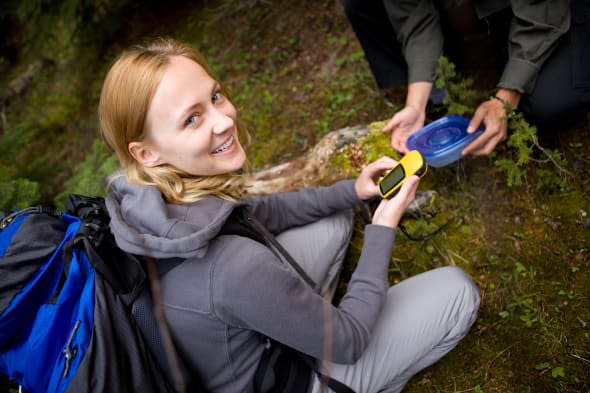Geocaching - What is it and is it for you?

What do you get when you combine a nice walk in the countryside with a treasure hunt? The answer is the increasingly popular hobby of geocaching.
Related Searches
What's it all about then?
Each game starts when a geocacher heads out to a specific point of interest – which could be one of their favourite places and usually involves a pleasant walk – and hides a small waterproof container with a couple of bits and bobs of no real value plus a pen or pencil and a notebook.
On their return home they will log the existence of the "cache" and its GPS co-ordinates on a website for others to see. Another geocacher may then decide to go and seek out the box. On finding it they may take one of the items and replace it with something else – along with writing a message in the logbook. When they get home they will note the find on the website along with a message for the enjoyment of the person who left it.
%VIRTUAL-AFCSponserAds%Is it suitable for anyone?
One of the big appeals about geocaching as an activity is that it's something the whole family can do and enjoy together, with the kids getting an overgrown game of hide-and-seek and the grown ups getting a nice walk in the great outdoors.
So I'll need a GPS device then?
Yes. The main essential is some kind of GPS receiver, allowing you to use satellite reference to pinpoint your own location and navigate to your destination. This could be a dedicated unit at a cost of £80 up to £300 or more – and it might have a map display or could just indicate the required direction with arrows. Alternatively many smartphones have GPS receivers and mapping capabilities – although don't rely on online mapping if you're heading out into the countryside as you're unlikely to get sufficient data coverage. It is possible, however, to download map data beforehand to view offline instead.
And what else will I need?
Most caches are hidden out in the countryside, so sturdy footwear and appropriate clothing for the weather are the order of the day. Pack some food and drink if you're out for a long walk and you might also want to pop some little trinkets or treats in your pocket to leave in the cache when you find it. It's possible that you'll need a car or motorbike to get out to more remote caches – though some geocachers get public transport and then walk, while others take a mountain bike.
This doesn't sound challenging enough for me
If standard geocaching doesn't float your boat then consider one of the dynamic variations. Sometimes time limits are placed on finding the caches, with people competing to find a series of them individually or in teams. These games are sometimes carried out in towns and cities as well as in the country. A variant called "geodashing" sees people racing around a series of waypoints without any actual caches. More like traditional orienteering really. If you want to introduce more of a gaming element to the concept, check out Google Ingress – which uses augmented reality via smartphones or tablets and allows users to "interact" with the game when they reach a given location.
Where can I find out more?
Check out the Geocaching Association of Great Britain website to get much more detail and to find out how to get involved locally. The largest site globally is Geocaching.com, which is free to use for basic activities and has a mobile app for use while on the job.
Do you enjoy geocaching? Leave some advice for others just starting out in the comments box below...




